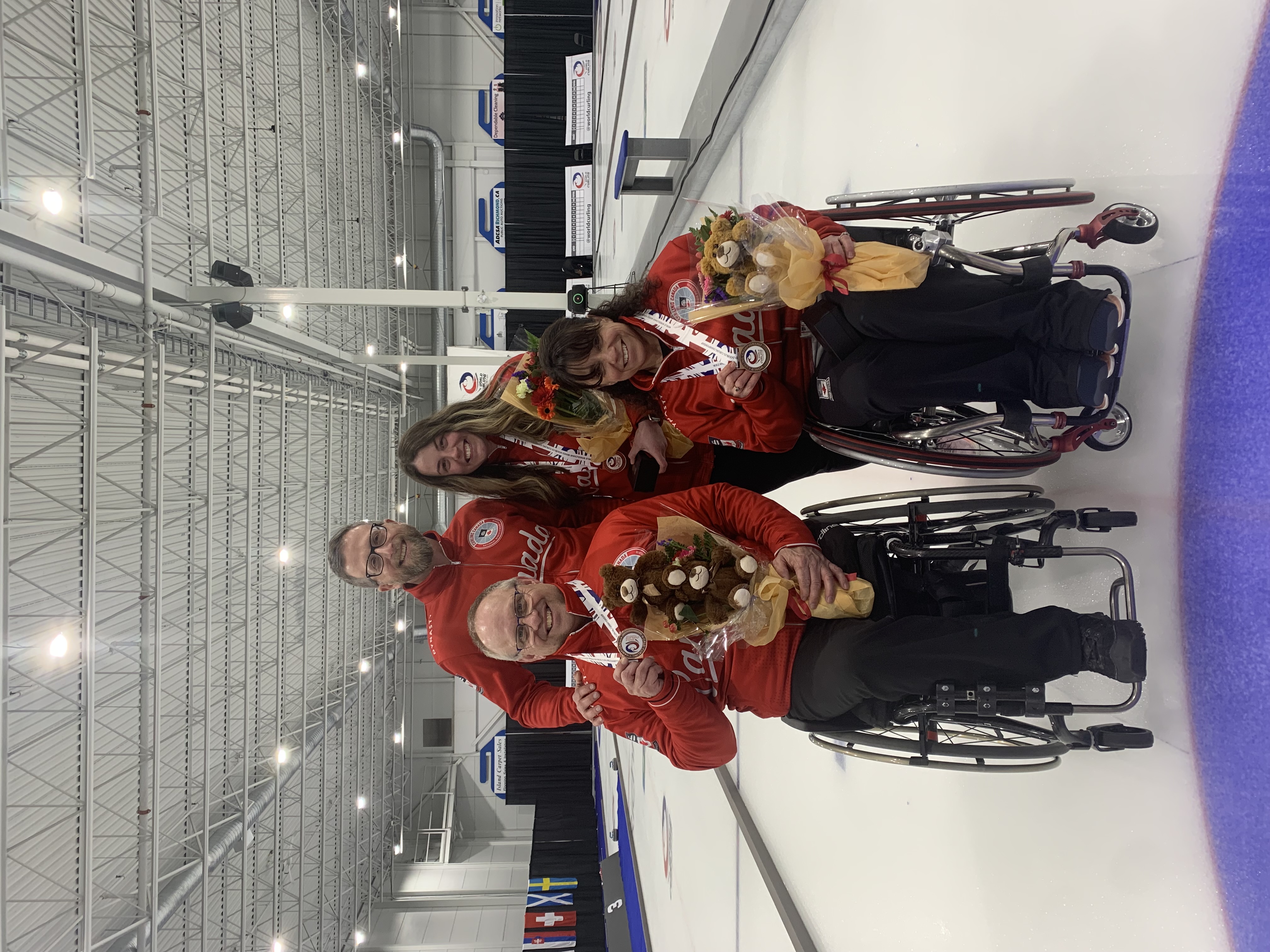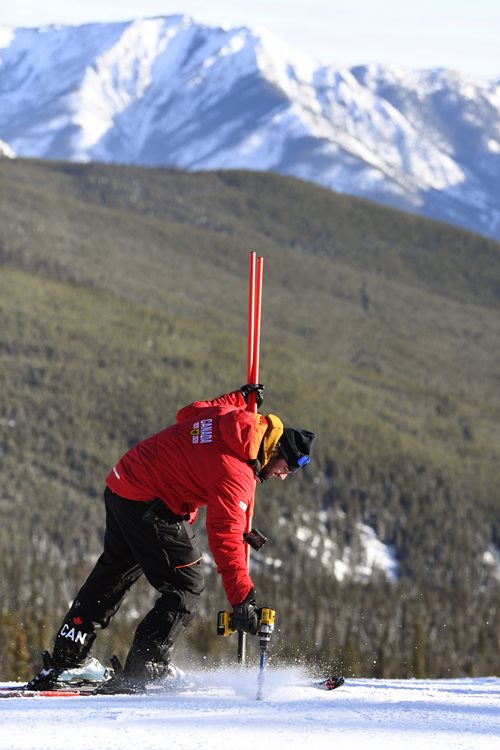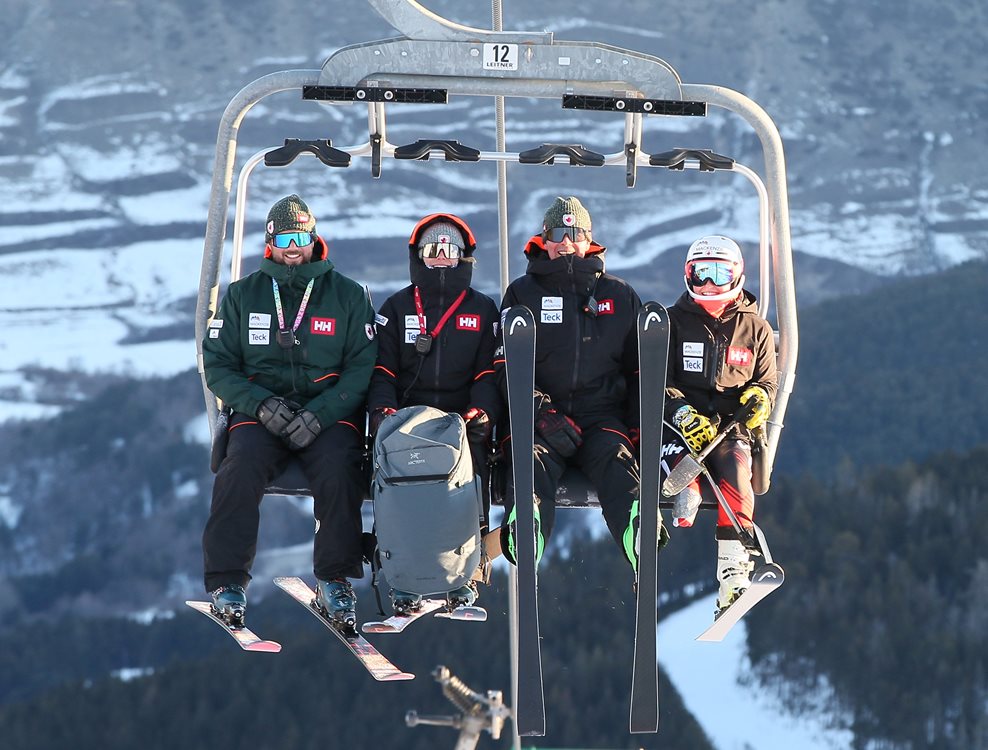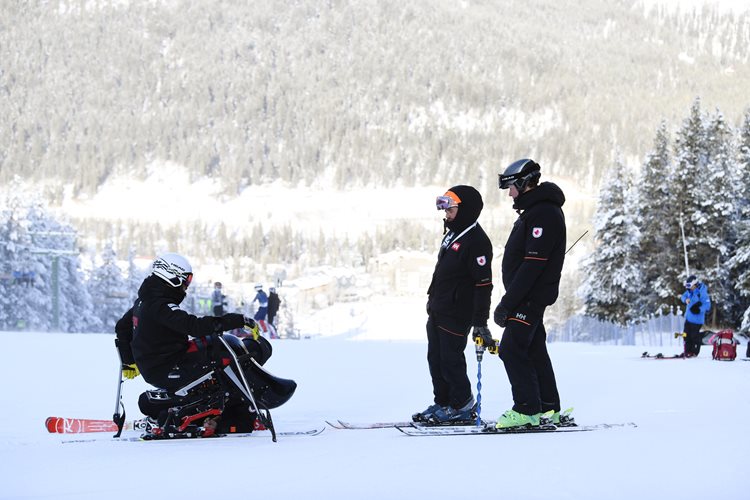ARTICLE
“My whole life, whatever I do teach, I love it. Teaching is about helping other people, making connections with others and then the growth. Same with coaching."
The connection between coaching high-performance athletes in an arena or up on a ski hill and teaching bright, ambitious students inside a classroom setting is, in Dana Ferguson’s experience, virtually symbiotic.
Ferguson, after all, was contemplating giving up competitive curling during her years pursuing degrees in both Phys-Ed and Education at the University of Alberta.
While on campus in Edmonton, she dabbled in instructing at camps and junior programs while looking to the future by substitute teaching at schools in the area.
“I love both,’’ she recalls. “So, I was torn. But I was lucky enough for my boss at the time to say: ‘Hey, why don’t you come work for the university and coach curling.’ I’m like: ‘But I’m a teacher.’ And he said: ‘Coaching
is teaching.’ So, I took that chance, 13 years ago, and it really allowed me to pursue curling. I was very fortunate. They gave me flexible hours. I was able to focus on curling and training, too.”
During those double-duty years, Ferguson collected one gold medal, two silver and a bronze at the Scotties Tournament of Hearts, representing Canada in 2019 as second on Chelsea Carey’s Calgary Glencoe Curling Club rink at the Women’s World Curling Championship in Silkeborg, Denmark.
And now, in leading Canada’s mixed wheelchair curling team, she has, using her teaching skills as a foundation, graduated with distinction as a head coach.
.jpg.aspx)
Consult her athletes for verification.
“There are coaches who are very good technically, understand whichever game you’re working in,’’ emphasizes Canadian wheelchair mixed curler Collinda Joseph. “But until you have the skill to be able to relay it to someone? I don’t think they can be effective coaches.
“Having the skill to teach someone helps them improve the way they play their chosen game. That’s been our experience with Dana.
“The thing that’s interesting about her is that we’ve been given the green light to debate. There’s no feeling of retribution, no personal grudges, for saying something she doesn’t agree with.
“It’s truly a team effort.
“Having a coach like that has been incredible for my own self-confidence, to build that, and in understanding I do have things to contribute, being able to come up with some game plans or how to tackle certain situations.
“It’s been amazing how she conducts herself, how she interacts with us. We’ve learned a ton working with her in just the last year and a half.
“It’s a significant piece to coaching, being able to teach.”
The path for an able-bodied curler to coach the wheelchair game travelled through Ferguson’s connection with the University of Alberta camps.
There, she met Mick Lizmore, head coach of the wheelchair curling program. After much coaxing, and admittedly curious, she attended a team training session at the Saville Community Centre in Edmonton.
“I was immediately fascinated by the game,’’ confesses Ferguson, “instantly thinking: ‘OK, hold on. There are a lot of similarities, some differences and this is really, really cool.’ So I started asking questions, one thing kinda led to another, they asked me to come out for a camp and I just fell in love with wheelchair curling.”

Dennis Thiessen is a highly decorated wheelchair curler, with three mixed curling Paralympic Games medals, including a gold at Sochi in 2014 in his collection.
“I will brag about Dana anytime,’’ he’s saying from his home in Sanford, Man. “She’s straight-forward, which I like. She explains something and if she needs to re-explain it, she will. Which I appreciate.
“This coming week we’re having a camp here in Winnipeg for mixed doubles and it’s all about strategy and writing a playbook.
“And we’re doing it
together.
“We’re going to be experimenting, going over videotape and learning
together in order to get better.
“Dana is very willing to adapt, to listen to what I have to say, for example. She isn’t hesitant to admit: ‘Yeah, that’s a good idea.’ And then we’ll try that idea out and see how it works. Rather than her say: ‘This is how you do it.’ No ifs ands or buts. No other way.
“She’s still learning. I’m still learning. We’re all still learning.”
Coaching at the highest level, of course, is not for everyone.
The inherent challenges are unique and the many decisions are very difficult, taking in as they do people’s hopes and dreams.
And lots of time invested.
Lots of time. Much of it away from home.
For example, a training day for Canada’s Para-alpine team head coach Will Marshall begins at the crack of dawn, 5 to 5:30 a.m., wherever he and the team are in the world, and can run 15 to 16 hours.
Beginning with spraying dye packs to put colour on the snow for training runs, setting the course and safety precautions on the runs to lunch, later-in-the-day dryland work in the gym, video and dinner, then preparation work on the next day’s itinerary.

Marshall credits his predecessor, Jean-Sebastian Labrie for tutoring him well.
“JS was always an amazing coach,’’ he lauds. “There’s a lot of amazing ski coaches in Canada. Once you get to the level we’re at, relationships are not just the relationships with the athletes and staff. In our world, you’re not hockey where you book an hour at the rink or there’s consistent quality for every block in the day.
“In our world. you’ve got to know the hotel owners, the guys running the lanes based in different mountains, the guys running the cargo in trucks, in all different countries and continents - we do a lot of stuff in South America, for example.
“You’re showing up at these mountains in Switzerland and you’ve got every nation in the world using for what’s best for them. So, it becomes a pretty tense environment.
“One thing that always blew me away was his ability to build those relationships. You have to take a lot of time outside of the team to get the team what it needs and that’s rarely ever seen.
“You’re all spending the same money, and one guy is getting the best training in the world and the guy at 3 o’clock is getting one hour and getting … well, not as good. In that game of relationships, he was very good, and taught me a lot.
“All the things around coaching: treating athletes like humans, like adults - we’re not dealing with 12-year-olds here, our oldest is 38. JS was always good, always had empathy for people.”

Marshall also credits the Pursuit Program, a joint initiative led by Canada’s national sport partners, with helping ease his promotion from trusted No. 2 man into the top role.
“Pursuit helped me find avenues of support, helped me talk to other coaches in other sports going through very similar things and be able to have a chat with them and to realize I’m not the only one,’’ he says. “We can all get into own heads a little as martyrs.
“I remember the first Pursuit, having flown home from South America for three weeks and I saw the cycling guys hauling bikes in - they’d been in Paris for four weeks - and it was, like: ‘Oh, it’s not just me that hasn’t been able to go home.’
“Pursuit is so refreshing. We get stuck in our own sports, and we just become so single-minded, and old-school - This is how it’s been done, so this is how we should do it.
“It is a fresh perspective of individuals to challenge you, help you and get you thinking outside the box.”
That outside-the-box thinking, the ability to connect and communicate and the willingness to empathize and be supportive. All are shared traits between successful teachers and their students, as well as successful coaches and their athletes.
Dana Ferguson has been retired competitively for roughly a year now, settling seamlessly, happily, into this next phase of her curling journey.
“Do I miss it, competing? Well, that was a fear of mine, to be honest. I loved riding the waves of curling, the pride of it all: I’m Dana the Curler and I love winning. But as a coach I’m getting a lot of that same satisfaction. Seeing the athletes perform, and perform well, makes my heart … swell.
“Being a coach doesn’t necessarily mean you’re going to be a great teacher and if you’re a teacher it doesn’t mean you’re necessarily going to be great coach. But I do think the two pair very, very well together.
“My whole life, whatever I do teach, I love it. Teaching is about helping other people, making connections with others and then the growth. Same with coaching.
“There is no feeling like someone coming back to me and saying: ‘Oh, my gosh! I’m playing so well now.’
“And I’m like: ‘
Yes! I helped!’
More, quite likely, than she, Will Marshall and so many other teacher/coaches like them populating the Canadian sports system, can fully comprehend.
